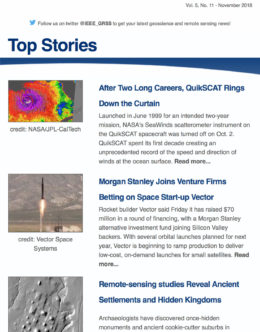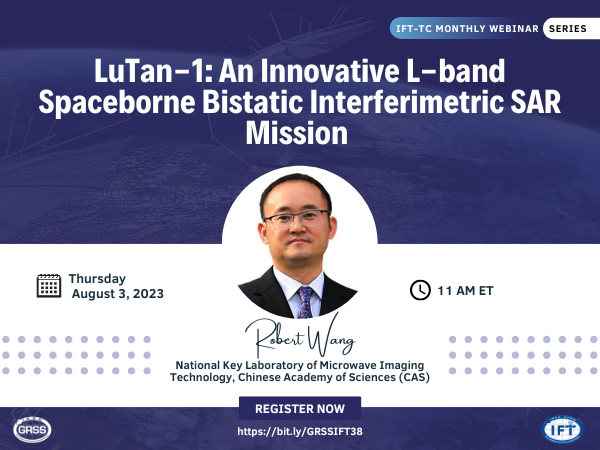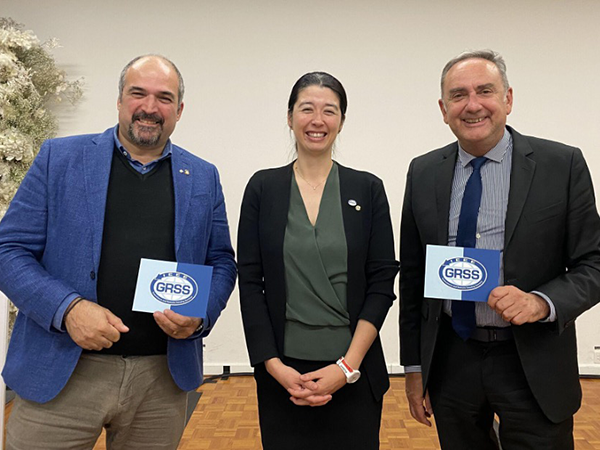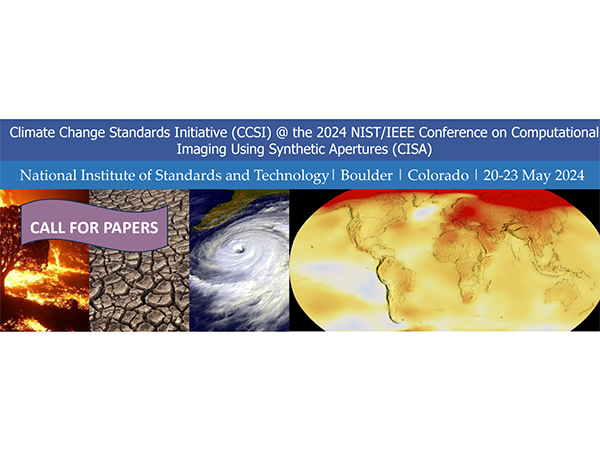LuTan-1: An Innovative L-band Spaceborne Bistatic Interferimetric SAR Mission
Webinar Speaker: Robert Wang
National Key Laboratory of Microwave Imaging Technology
- August 3rd, 2023
- 11:00 A.M. Eastern Time
- Sponsored by GRSS IFT-TC
About the Webinar
LuTan-1 is an innovative spaceborne Synthetic Aperture Radar (SAR) mission with bistatic interferometry capability. The mission is composed of a constellation of two identical satellites, each carrying an advanced L-band full-polarimetric SAR. It provides images with spatial resolution down to 3 m and swath up to 400 km. Since the launch in early 2022, two operation modes have been planned to serve the main objectives: bistatic mode for DEM generation and mono-static mode for surface deformation mapping. In this talk, I will provide an overview of the SAR system of LuTan-1, describe the technical challenges occurred during the development such as phase synchronization, range ambiguity and non-linear FM waveform, and present the preliminary LuTan-1 results from the bistatic imaging, DEM generation from bistatic interferometry, deformation mapping from mono-static interferometry and ground target classification from the unique compact polarization.
About the Speaker


Prof. Wang was born in Henan, China, in 1980. He received the B.S. degree from Henan University, Kaifeng, China, in 2002, and the Ph.D. degree from Graduate University of Chinese Academy of Sciences, Beijing, China, in 2007. He was a Senior Research Scientist with the Center for Sensor systems (ZESS), University of Siegen, Germany, from 2007 to 2011, where he contributed to many joint projects supported by ZESS and Fraunhofer-FHR, e.g., TerraSAR-X/PAMIR hybrid bistatic SAR mission. Since 2011, he has joined the Aerospace Information Research Institute, Chinese Academy of Sciences (CAS), Beijing, China, where he is currently the director of the National Key Laboratory of Microwave Imaging Technology and a co-principal investigator with the Helmholtz-CAS Joint Research Group, Beijing. He is the radar payload principal investigator of the LuTan-1 mission and is responsible for several high-resolution spaceborne imaging radar missions supported by the National High-Resolution Earth Observation Major Special Program of China. His research interests include mono-/multi-static SAR imaging, high-resolution wide-swath spaceborne SAR systems and imaging models.
Dr. Wang has been an IEEE Member since 2007 and elevated to an IEEE Senior Member of Geoscience and Remote Sensing Society in 2012. He was elected as Member of IEEE GRSS Technical Committee on Instrumentation and Future Technology (IFT-TC) in 2011. He served as a session chair in IEEE International Geoscience and Remote Sensing Symposium in 2011, 2012, 2013, 2015, 2016, 2017, 2019, and 2020. He also contributed for GRSS journals with 18 papers handled as an associate editor for TGRS, 96 papers reviewed for TGRS, and 111 papers reviewed for GRSL. He is also a very prolific author in GRSS journals and conferences, with 56 papers published in TGRS, 13 papers in J-STARS, 58 papers in GRSL, and 50 papers in IGRASS.




























